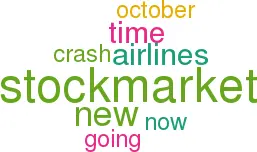Stockmarket jitters - aviation implications
November 1997


For some time stock–market analysts have been warning that share prices were overvalued, so at the time of writing we are not quite sure if the 12% drop at the end of October on the New York and London stock exchanges represent a crash or merely a correction. What are the possible implications?
Traffic demand The October 1987 stock–market crash had no perceptible repercussions on traffic growth despite predictions that the "wealth effect" would depress travel. This time round the underlying economies of North America and Europe are more healthy than they were ten years ago so we would suspect that travel plans are not going to be curtailed as a direct result of the stock–market chaos.
However, in Asia there has also been a series of currency crises which will affect the emergent flying class who are finding that their Ringitts and Pesos, and maybe Hong Kong dollars, are worth 25% less abroad. And through their alliances the leading airlines are exposed to developments, good or bad, in all areas of the world.
Financing Reduced stock–market valuations should in themselves not affect airlines' capacity to find finance for capital expenditure — unless their stock–market decline is significantly worse than other industries, which would signify that they are underlying doubts about their credit worthiness.
The danger is more subtle. There is still a great deal of liquidity in the markets looking for a home. Now that shares are out of favour, the tendency will be to look for other investment vehicles, and aircraft have proved to have certain appeal in these circumstances as solid yet transferable assets. Such thinking led to speculation in aircraft values and production slots in the wake of the 1987 stock–market crash. Initially, this provided welcome new sources of funds and provided the leasing companies with handsome profits, but ultimately it led to over–leveraged airlines which were incapable of dealing with the traffic recession of the early 1990s.
New issues This is what causes most concern. Equity funding for new entrant airlines is going to become much more difficult. Virgin Express' announcement on October 22 that it intended to float on the Nasdaq and Brussels stock exchanges in November was unfortunately timed, with the shares of low cost new entrants taking a nasty beating.
Ryanair lost 19% of its value in one day. It was also a victim of rumours about BA starting up a new low cost subsidiary. Debonair, which had just issued a profits warning, saw its share price drop below its June issue price. Plans for other IPOs, such as those for Air Europe, the Milan–based long–haul charter operator Britair, the French regional carrier and Citybird, the Belgian start–up may now have to be revised, although Jonathon Ornstein, CEO of Virgin Express, immediately insisted his IPO was going ahead — "Two weeks is a long time", he observed.
Investors have been betting on finding a European Southwest among the European carriers, and, as a consequence, remarkably high ratings were achieved (Ryanair was floated at a P/E of over 18). That magical period may have now come to an end.